Here’s a chance for you to take a trip behind the scenes at some of the Tibetan Buddhist nunneries in India that are supported by the Tibetan Nuns Project.
Whether the nunnery is large or small, there are many tasks or chores that the nuns must do to ensure that they are as self-sufficient as possible and to make sure that the nunneries function smoothly and are well maintained.
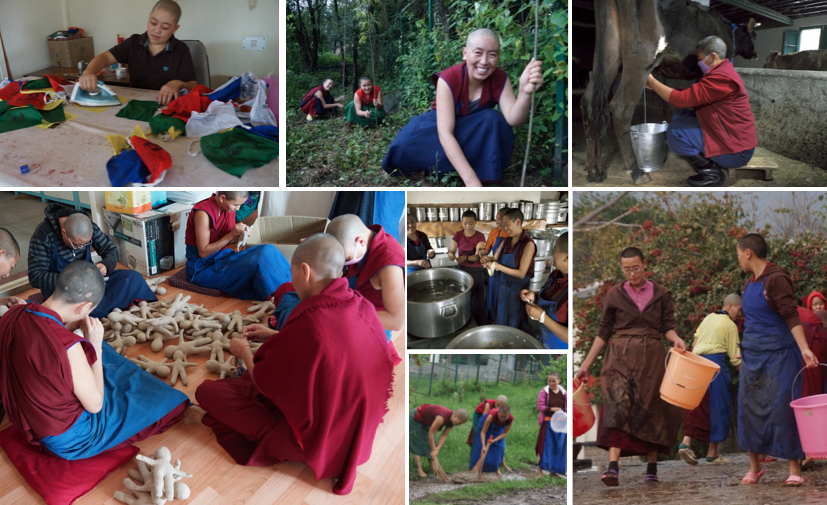
Collage of some of the many tasks of the nuns at Dolma Ling Nunnery in India, in addition to their studies and prayers.
In terms of regular tasks, one could view a nunnery as something like a cross between a very large household and a university or college. As you can imagine, there’s a lot of chores that need to be done each day, week, month, and year in order to keep everything running like a well-oiled machine.
Vicki Robinson, a Tibetan Nuns Project board member and donor, has stayed at Dolma Ling Nunnery in India and was impressed by the amount of work that the nuns do in addition to their studies. “Something I always tell people and that I didn’t really appreciate until I actually stayed there for a while was how much physical work the nuns do,” says Vicki. “They do their studies and the kitchen work and all that, but they are basically outside maintaining the physical nunnery complex. I think many people wouldn’t know that this is a part of their everyday routine.”
Cooking
Let’s start with cooking. All the nunneries follow a vegetarian diet. The largest nunnery we support, Dolma Ling Nunnery and Institute near Dharamsala, is home to over 250 nuns plus over 30 staff, so preparing meals each day for that number of people requires a lot of time and organization. The Dolma Ling nuns take turns on kitchen duty in three-day rotations. They rise at 3 a.m. to start preparing breakfast.
Each Saturday a group of nuns at Dolma Ling Nunnery make tofu to supply the nunnery kitchen. The nunnery sells any extra tofu to visitors and to the local community to help support the nunnery. There are six nuns at Dolma Ling who know how to make tofu and they take turns in teams of three to do the work. They start 6 am and finish normally by 2 pm, but when they have large orders their work ends at 10 pm. In 2015, a generous donor, Norman Steinberg, helped the nuns purchase a new tofu-making machine that allows the nuns to make larger batches of tofu more efficiently.
Shopping
It’s quite a task to buy vegetables, rice, oil, and other supplies needed to feed about 280 people a day. The Dolma Ling nuns must rise before well before dawn and travel to the wholesale vegetable market where they must bargain with the vegetable sellers as they work their way through their shopping list. Thanks to generous donors, in 2015 we were able to supply the Dolma Ling nuns with a new truck. Here’s a little video, made by the nuns, of some shopping trips made with the new truck.
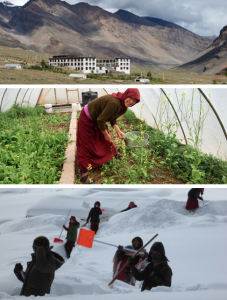 Getting food and cooking fuel at remote nunneries in the Himalayas is even more challenging. For instance, at Sherab Choeling Nunnery in the Spiti Valley (shown right), the nuns try to grow as much food as they can during the short summer growing season and they must store up supplies for the long, harsh winter.
Getting food and cooking fuel at remote nunneries in the Himalayas is even more challenging. For instance, at Sherab Choeling Nunnery in the Spiti Valley (shown right), the nuns try to grow as much food as they can during the short summer growing season and they must store up supplies for the long, harsh winter.
Two winter’s ago the weather was so severe that the nunnery ran out of cooking gas and for over two months the nuns had to rely solely on firewood to cook. The heavy snowfalls meant that all the local villages were cut off and the nuns were unable to get supplies. In order to fetch water from the nearby village, the nuns had to clear a path through waist-deep snow. Thankfully the nuns had enough stores of vegetables and tsampa (roasted barley flour) to last them through the winter months.
Cleaning
Nunneries like Dolma Ling and Shugsep, both built by the Tibetan Nuns Project, are large complexes like universities with many building that must be carefully maintained. The nuns proudly contribute a great deal of energy to maintaining the nunneries, including weekly cleaning, regular oiling and polishing of woodwork, spot painting, and general ongoing repairs.
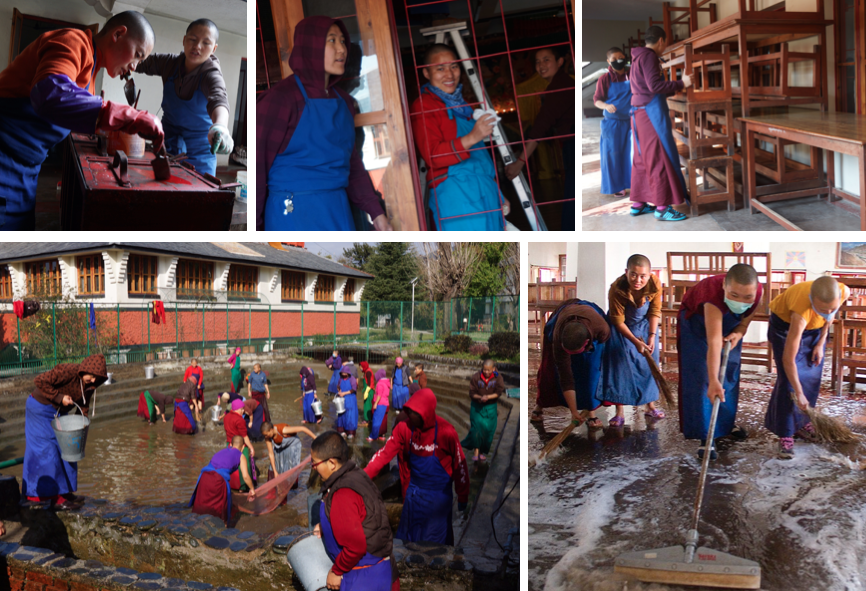
Visitors to Dolma Ling Nunnery often remark upon the cleanliness of the nunnery and the condition of the buildings. The nuns work hard to maintain the nunnery but occasionally must hire outside workers for major projects such as painting the housing blocks.
It’s a constant battle with the elements to keep the buildings sound, not just because of the size of the institute, but mainly because of the harsh climate and the toll it takes on buildings. Dolma Ling is located in the foothills of the Himalayas in an area that experiences one of the heaviest monsoons in India as well as both the heat of the plains and the cold of the mountains. If you would like to support the painting and maintenance of the nunneries we would love your help. You can learn more and donate here.
Self-Sufficiency Projects
A primary goal of the Tibetan Nuns Project is to help the nuns achieve self-sufficiency through education, skill building, and income-generating projects. Dolma Ling Nunnery is both the largest nunnery we support and also has the widest range of self-sufficiency projects, including tofu making mentioned above. The nuns run a small shop selling basic supplies and a nuns’ café, and they have a thriving handicrafts program with products sold through our online store.
The handicrafts made by the nuns including prayer flags, malas (prayer beads), shopping bags, kataks (prayer scarves), Tibetan door hangings, and handmade monk and nun dolls. These products are available for sale at Dolma Ling Nunnery and internationally through our online store. The nuns also take photos and help to produce the annual Tibetan Nuns Project wall calendar. In addition, the nuns are regularly asked to perform pujas (prayers) and offer butter lamps on behalf of people around the world who may be facing obstacles or who suffer ill health.
Gardening
Gardening and landscaping around the nunneries is undertaken by the nuns themselves. The lush gardens and flowers are a special place for birds, butterflies, and other insects. They are part of what makes the atmosphere of the nunneries very special and restful.
At Dolma Ling Nunnery they hold a flower competition each year.
So, as you can see, the nuns lead very busy lives. In addition to their many classes, debate sessions, prayers, and personal study time, they each contribute to the careful running and maintenance of their nunneries.

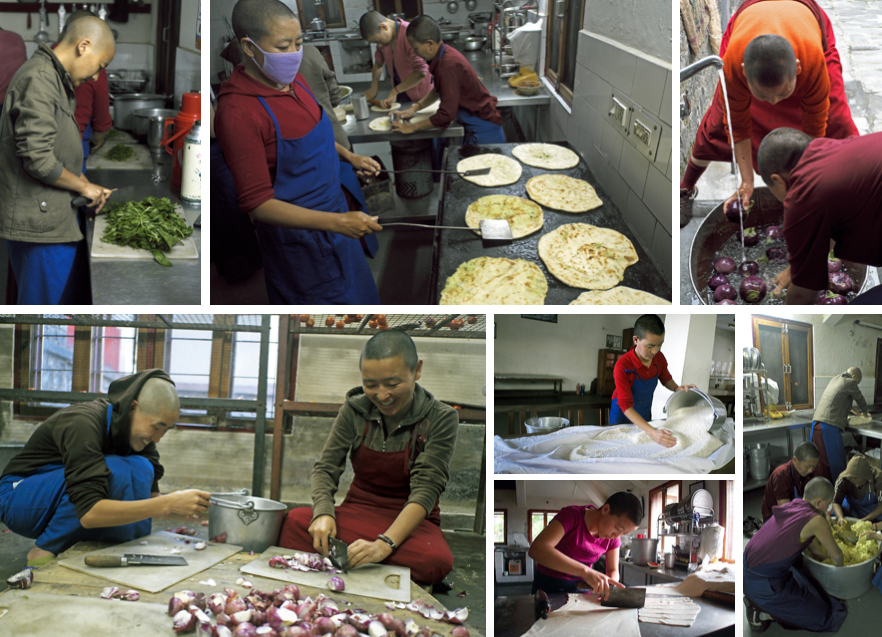
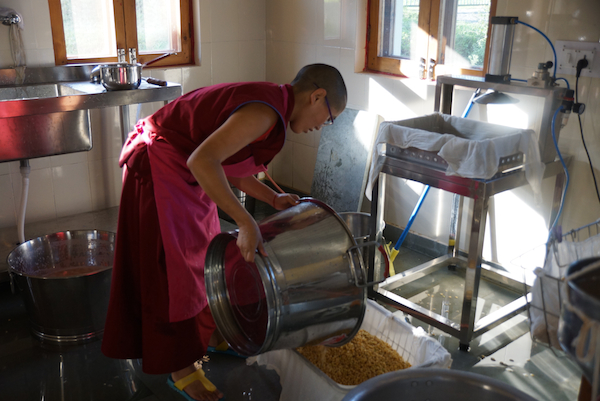
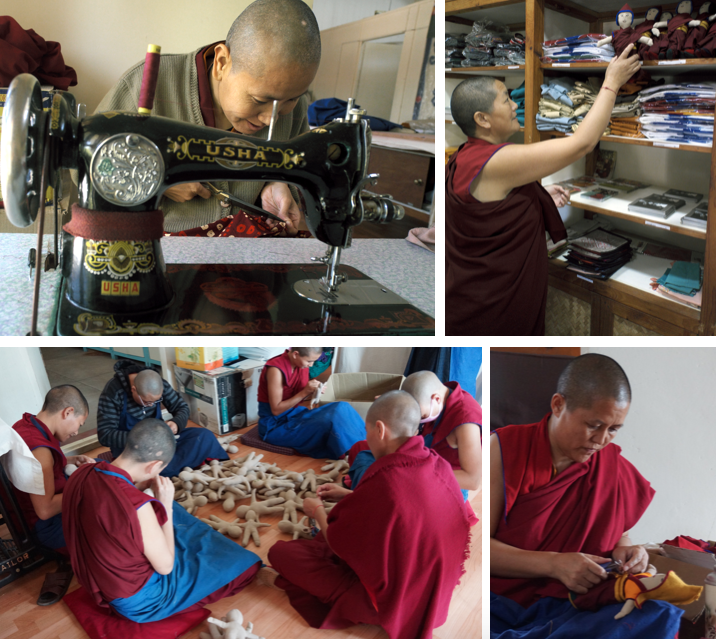

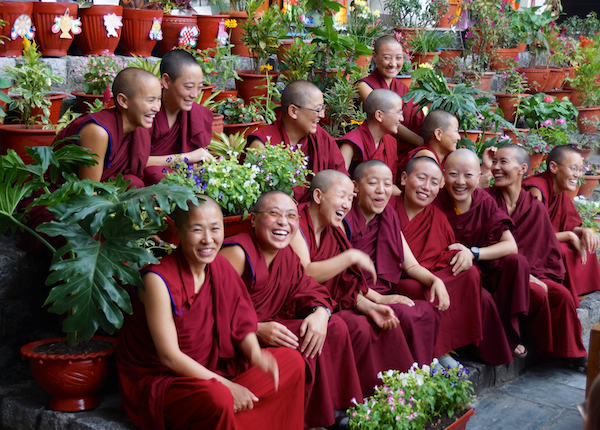
I would love to see some photos from Geden Choeling nunnery too – that is where I sponsor two nuns, my beloved ‘daughters’.
Dear Karen, Thanks so much for your comment. The media nuns are based at Dolma Ling and we also have more visitors to Dolma Ling who kindly share their images with us. We’ll try to share more photos and news from Geden Choeling Nunnery via the blog and social media. Thanks so much for your support of the nuns!
I also sponsor a nun from Geden Choeling Nunnery and would like more coverage and photos from there. My husband and I have also helped finance some building projects so we would love to see new photos.
Dear Pamela, Thank you so much to you and Ned for sponsoring Venerable Tenzin Wangmo and for your amazing support of many building projects at Geden Choeling. We are eager to share more photos and news of the nunnery with you. We’ll send you an email with a few photos and will also put together a special blog post focussed on this nunnery, with some of the photos and audio clips that we have, and we’ll share the link with you as soon as possible. Thank you again for your wonderful support!
Thank you so much. Anything that you can show us would be wonderful!
Haiku for Tibetan Nuns and Project
Thank you for hard work!
Sponsors for life-long learning
Generosity
Breathe Education!
Five texts: twenty years study
Geshema degree!
A good project indeed I want to know about the nunnery more,how to get there,or order their products specialy the dolls n bags
Thank you so much for your interest in our work to help the nuns. You can order products, such as the dolls and bags, from anywhere in the world via our online store at https://tnp.org/products/. You’ll see that there are dozens of products and also that it is possible to request prayers from the nuns. All seven nunneries that we support are located in northern India. The largest, Dolma Ling, is outside Dharamsala in the Kangra Valley.